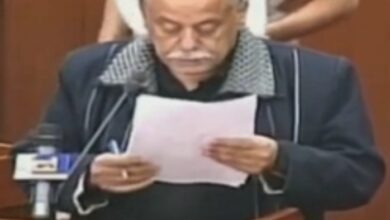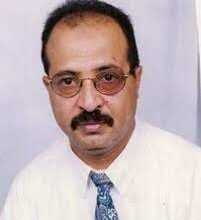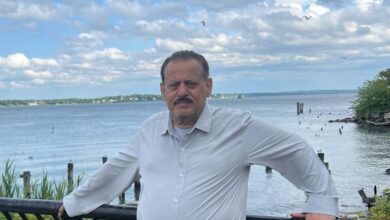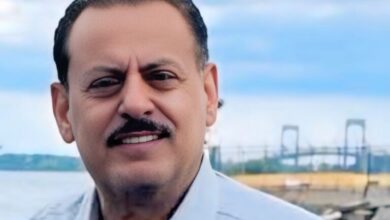Aunt” Khadouj”
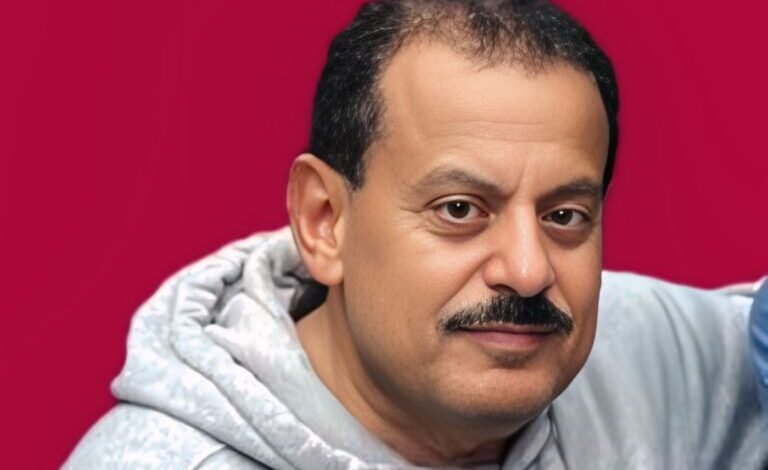
Yemeni mp
Ahmed Saif Hashed
Mohammed Qaid Hashem, or as he is commonly known in Aden, Mohammed Al-Harbi, is my father’s cousin. His father, the village leader, left for Aden early on and lived there until his passing. Mohammed grew up in Aden, though I barely know him and have only visited him once or twice with my father, who wanted to show me that I had family and relatives in Aden. This was likely months before the events of January 1986. We found him kind, polite, and welcoming. He had adapted to the city’s life and spirit, with appealing features that instilled a sense of reassurance, even though he spoke little.
I visited his wife, Aunt “Khadouj,” on January 20, 1986, most likely. She seemed to brighten at my arrival, looking forward to my visit with a mixture of hope and despair. She saw in me the star ”Suhail”, believing I might bring a glimpse of relief, yet the night was dark, grim, and heavy with the sorrow that lay beneath something even more profound.
Like a drowning man grasping for a straw, seeking a lifeline, yet no escape exists against what is deemed impossible. It is not easy to know what prison he is in, let alone seek the rescue of bonds that lie beyond your control.
This situation resembles what we live today, if not more severe and painful than what came before. Back then, there were imprisonments and extrajudicial executions, but now imprisonment, execution, and corruption coexist. In the past, a single family member would be imprisoned, whereas today, entire families are detained—like the example of Eqbal Al-Hakimi’s family. Yesterday’s corruption was limited and required a magnifying glass to be seen, while today’s corruption spans the breadth of the sky and the earth. Words fail to capture the extent of it.
The past is bad, and the present is mostly worse.
Now, you only need to know where your loved one is imprisoned! You must search for them until you are dizzy. Every side detains, and we have countless such instances. Each individual, no matter how small or insignificant, can imprison you. The easiest thing they do is restrict your freedom and torment you with a thousand excuses. If you stand to defend your case, they crush you with the phrase, “You want an excuse or a donkey?”
They imprison you, and then your news is cut off for as long as God wills. Your hopes wane, disappointments multiply, and you search for a needle in a haystack. Information about your loved one lies within the grip of an oppressive authority. Most importantly, you find yourself today in an endless maze. You don’t know whom to address! To whom do you complain? Where do you seek justice? Who holds the authority to release the person you’re searching for?
In January 1986, the victors took Khadouj’s husband from their home, imprisoning him in a closed and hidden cell, much like the one I stood before on January 18. Those crammed inside were like a mass of flesh, unable to stand on their feet or catch their breath, parched to the point of death and suffocated beyond belief.
Mohammed Al-Harbi suffered from asthma. He reportedly died from asphyxiation in his cell, or so revealed some of his fellow detainees who were fortunate enough to escape the clutches of a cruel death. Mohammed suffocated in his overcrowded prison, and his soul departed to its Creator after being freed from the grip of the tormentor, leaving his body behind as damning evidence of the cruelty, crime, and horror inflicted by his captors.
To this day, Mohammed’s family does not know where he is buried, nor have they received any notification or official word of what happened. He left behind small children and a grieving wife tormented by loss and endless waiting.
Khadouj carries a love for her husband that surpasses the burdens of the earth and the rainclouds of the sky. They married out of a love story filled with challenges and crossings. Both worked in a public civilian institution, and their love had space and orbit. They loved each other and were destined to be together forever. Aunt Khadouj has a heart more magnificent and kinder than any other.
Khadouj is imbued with the kindness and patience of the people of Aden. Oh, how warm and forgiving the people of Aden are! In times of need and hardship, they stand by each other. Their relationships are genuine and filled with innocence. They are at peace with themselves, carrying hearts as pure as crystal, with pages whiter than snowflakes.
The people of Aden endure all the evils that the winds have hurled at them and that fate has poured upon their heads. How much sorrow, pain, and profound tragedies have the cruel inflicted upon Aden and its good people!
In wars, there are evils and an insatiable death, followed by the painful wait for loved ones who do not return. How harsh and cruel it is to be taken from the arms of your children and your wife, only to be hidden away from all who love you, severing all ties to your news. They erase you forever without extinguishing the hope of your return to your children and your wife. How tormented is the one who waits for a hope that never brings what they seek, and for an expectation after a long, life-consuming patience, only to discover that they were deceived, and the hope they clung to was naught but a mirage.
How the wife suffers when fate casts her beloved into the unknown for a mere opinion or stance he believes to be right, leaving her to wait for months, years, or perhaps the rest of her life pinned against the wall of anticipation. It is a hellish torment, a descent deeper than fire.
Many pay the price for the mistakes and sins of others. Leaders commit devastating follies against their people, even against their supporters who blindly follow, unaware of what has happened and what is happening, bearing the burdens and sins of actions they did not commit. The victims march toward death and oblivion.
Countless are the victims led by their leaders into the perilous gamble of destruction and hell. Many are the victims of wars, greed, oppression, and the tyrannical totalitarianism that reigns.
* * *


